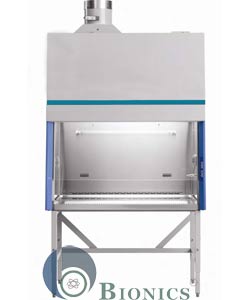Social Network Trending Updates on microbiological safety cabinet
Social Network Trending Updates on microbiological safety cabinet
Blog Article
Class 2 Biosafety Cabinets – Vital for Lab Safety and Biological Containment

In today’s scientific and clinical labs, safety for personnel and samples is non-negotiable. Whether it's biotech development, pharmaceutical research, or microbiological analysis, biosafety cabinets form the backbone of contamination control.
Of all types, Class 2 cabinets are most commonly used due to their efficiency and versatility. These units are crucial for working with moderate-risk organisms and sensitive samples.
Biosafety Cabinets – How They Work and Why They Matter
Biosafety cabinets are specially designed, enclosed systems that ventilate and filter lab air. They use high-efficiency filters to purify air entering and leaving the cabinet.
These units are generally classified into Classes I, II, and III depending on airflow and application needs. Among these, Class II units strike a balance between user, product, and environmental protection.
Why Class II Cabinets Are the Preferred Choice in Labs
Class 2 Biosafety Cabinets are designed to safeguard three aspects: the operator, the sample, and the environment. They generate a vertical airflow that reduces turbulence and contamination.
Air is treated using dual filtration systems to ensure safe circulation and exhaust. These cabinets are frequently used in labs handling infectious agents or clinical samples.
What Makes Class 2 Cabinets Effective in Labs
A Class 2 microbiological safety cabinet includes several integrated safety mechanisms such as:
• Medical-grade filters for capturing contaminants
• Steady air movement to reduce airborne particle circulation
• Pressure differentials that maintain internal containment
• Germicidal UV lamps to disinfect the work area
• Noise-reducing construction for better working conditions
• Clear front panel for visibility and safety
These elements ensure safety, comfort, and efficiency in day-to-day lab tasks.
Applications in Research and Healthcare
Class 2 Biosafety Cabinets are key equipment in healthcare, molecular biology, and quality control. They are critical for DNA/RNA extraction, pathogen culture, and molecular assays.
Whether in hospitals or drug manufacturing, these units are essential for clean procedures.
Benefits of Using Class 2 Biosafety Cabinets
Using Class 2 cabinets offers multiple advantages including operator protection and experimental reliability:
• Reduces the risk of sample cross-contamination and error
• Prevents accidental exposure to infectious materials
• Improves environmental safety by filtering outgoing air
These cabinets support biosafety goals Biosafety Cabinets while improving lab productivity.
Cabinet Types and Global Compliance
Top manufacturers ensure their cabinets meet certifications like NSF 49, EN 12469, and WHO recommendations. Class 2 units are sub-classified as A1, A2, B1, and B2—based on varying airflow balance and ducting needs.
• Type A2: Recirculates 70% and exhausts 30% of filtered air
• Type B2: Used for hazardous vapors and chemicals
Selecting the right configuration ensures compliance and safety.
Tips for Purchasing the Ideal Biosafety Cabinet
Before purchasing, consider:
• The types of agents and materials handled
• Ventilation compatibility and placement
• Energy consumption and maintenance frequency
• Manufacturer reputation and post-sale support
Consulting with experts ensures the cabinet fits both budget and compliance goals.
Best Practices for Using Class II Biosafety Cabinets
For optimal results:
• Avoid placing near doors, vents, or fans
• Ensure annual certification and airflow testing
• Educate staff on cabinet operations and safety
Operational best practices include:
• Always wear appropriate lab PPE
• Work calmly to prevent airflow disturbances
• Clean all contact points post-operation
• Use UV lights only when cabinet is off and unoccupied
Final Thoughts on Class 2 Biosafety Cabinets
Class 2 biosafety cabinets are essential for labs that value safety, precision, and cleanliness. They ensure contamination-free experiments and personnel safety.
From pathology labs to advanced genetic testing, Class II cabinets copyright the highest biosafety levels. When investing in a biosafety cabinet, prioritise compliance, usability, and long-term support—because lab safety is non-negotiable. Report this page